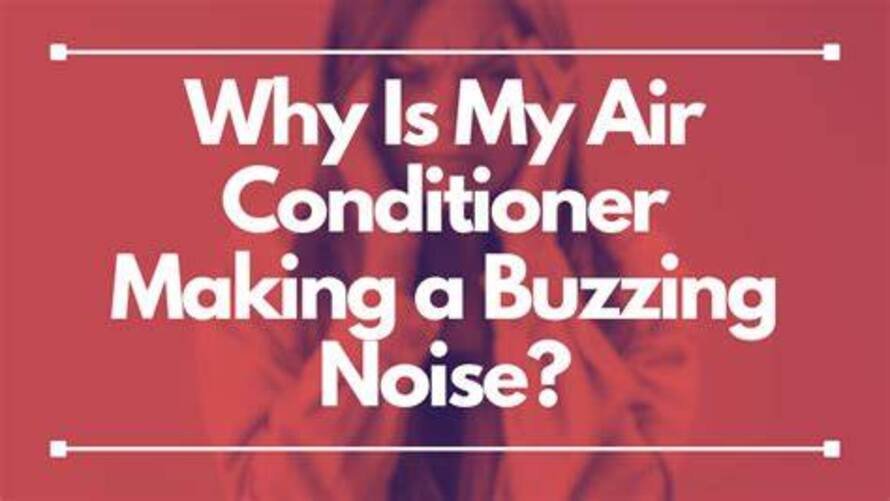Air conditioners are essential for maintaining comfort in homes and buildings, especially during warmer months. However, when your air conditioner starts buzzing on and off, it can signal a problem that needs attention. Understanding the causes and solutions for this issue can help ensure your system runs efficiently and lasts longer.
In this article, we’ll explore the common reasons behind a buzzing air conditioner, practical solutions, and when to call in a professional.
Common Reasons for a Buzzing Air Conditioner
1. Electrical Issues
One of the primary reasons for buzzing sounds in an air conditioner is electrical problems. These can include:
Loose Connections: Loose or frayed wires can cause intermittent buzzing as the electrical current struggles to pass through.
Faulty Capacitors: A capacitor helps start the compressor and fan motors. If it’s damaged, it may produce a buzzing sound while attempting to operate.
Relay Switch Issues: A malfunctioning relay switch may create a buzzing noise when it fails to complete the circuit.
2. Compressor Problems
The compressor serves as the core component of your air conditioning system. Buzzing sounds could indicate:
Overload: If the compressor is struggling to handle its workload, it may produce a buzzing noise.
Wear and Tear: Over time, internal components of the compressor can degrade, leading to abnormal sounds.
3. Refrigerant Issues
Low or leaking refrigerant can cause your system to work harder than necessary. This strain may lead to buzzing noises as the air conditioner cycles on and off in an attempt to compensate.
4. Fan Motor Troubles
A buzzing sound might originate from the fan motor if it is:
Obstructed: Dirt, debris, or bent blades can interfere with its operation.
Failing Bearings: Worn-out bearings in the fan motor can lead to excessive noise.
5. Dirty or Blocked Components
Clogged air filters, coils, or vents can force your system to overexert itself. This added strain can create buzzing noises and disrupt normal operation.
6. Loose or Damaged Parts
Loose screws, panels, or other components can vibrate when the air conditioner is running, leading to a buzzing noise.
How to Fix a Buzzing Air Conditioner
1. Inspect Electrical Components
Check for loose connections or frayed wires around the unit. Turn off the power before conducting any inspections, and consult a professional if you’re unsure about handling electrical components.
2. Test the Capacitor and Relay Switch
Use a multimeter to test the capacitor and relay switch for proper functionality. Replace any faulty components promptly to avoid further damage.
3. Check the Refrigerant Levels
Insufficient refrigerant levels can lead to system failure. Only certified professionals should handle refrigerant refills or repairs to comply with safety regulations.
4. Clean and Clear Obstructions
Air Filters: Replace clogged filters to improve airflow and reduce strain on the system.
Outdoor Unit: Clear debris around the unit and clean the condenser coils to enhance efficiency.
Fan Blades: Ensure they are free from dirt and properly aligned.
5. Tighten Loose Components
Inspect screws, panels, and other parts of the unit. Tighten any loose components to prevent vibrations.
When to Call a Professional
While some issues can be resolved with basic maintenance, others require the expertise of an HVAC technician. Contact a professional if:
The buzzing persists after performing routine maintenance.
You notice leaks or significant refrigerant loss.
Electrical components, such as capacitors or relay switches, need replacement.
The compressor shows signs of severe wear or failure.
Preventing Future Issues
Regular maintenance is key to avoiding air conditioner problems. Follow these tips to keep your system in top shape:
1. Schedule Annual Tune-Ups: Professional inspections can identify potential problems before they escalate.
2. Replace Filters Regularly: Depending on usage, replace filters every 1-3 months.
3. Keep the Outdoor Unit Clean: Ensure the area around your condenser unit is clear of debris.
4. Monitor System Performance: Pay attention to unusual noises or changes in performance and address them promptly.
Conclusion
A buzzing air conditioner is not only annoying but can also indicate underlying problems that may lead to costly repairs if left unchecked. By understanding the causes and solutions for this issue, you can take proactive steps to maintain a comfortable and efficient cooling system.
If you’re unsure, promptly consult a certified HVAC technician – acjakarta.com. Resolving issues early can prevent unnecessary expenses, time loss, and inconvenience, and discomfort in the long run.
